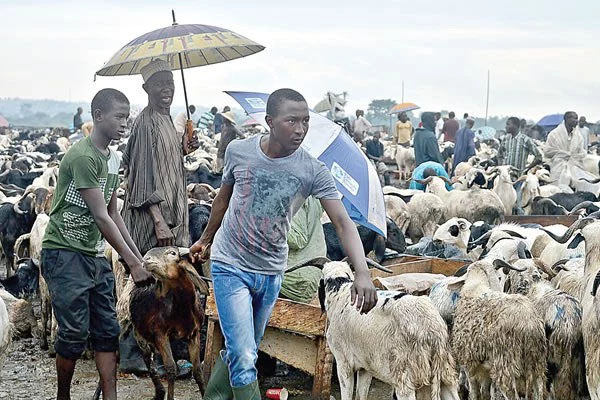
As Muslims nationwide prepare for the upcoming Sallah celebration, there has been an eleventh-hour surge in purchases which came with the lamentations of the high cost of sacrificial animals and essential food items needed for the Sallah celebration.
This festive spirit is dampened by concerns over the soaring prices of sacrificial animals and necessary ingredients. Many Muslims across the country are expressing dismay at the high costs of rams of various sizes, as well as staples like tomatoes (peppers) and palm oil, which are crucial for feasts during this auspicious occasion.
Sunday PUNCH had earlier reported that a big ram was sold between N500,000 and N700, 000 with the least sold for N250,000.
Also, a renowned economist and member of the Presidential Economic Coordination Council, Bismark Rewane had expressed concern over the increase in the cost of tomatoes in Nigeria, which rose from N40,000 to N150,000 per bag within a year.
Meanwhile, some Islamic clerics and economists who spoke with Sunday PUNCH have advised the Muslim faithful to ‘cut their coat according to their cloth’ considering the country’s economic challenges.
A Professor of Islamic Studies at Hikmah University, Kwara State, Lateef Oladimeji, said that affordability was fundamental during the Sallah celebration, stressing that the high cost of rams and other items does not affect the celebration even when an individual cannot afford it.
He said, “The affordability is very fundamental as far as Eid el Kabir is concerned just like going on Hajj is for those who can afford it. If the cost of ram is on the high side and some Muslims cannot afford it, it doesn’t affect their celebration.”
Similarly, the Secretary General of Ogun Muslim Council, Kamaldeen Akintunde, noted that most Muslims would be celebrating a “bleak” Sallah due to the economic hardship and hike in the prices of rams and food items.
He said, “Even though the present experience is not new, having had the same in the Covid-19 era, the global recession has made life difficult, forcing the government to make draconian economic policies.”
Also speaking, a Lead Missionary at Nasrul-llalhi-l-fathi (NASFAT), Adepoju-Alaseyori Ridwanullahi, said the people were behind price hikes making it hard for others.
He said, “The economy of the country is not friendly at the moment, the business dealers (sellers of ram and food items) are hiking the price of their commodity for the sake of the celebration, this shows the lack of fear in them.”
Avoid debt
A Professor of Economics at the Obafemi Awolowo University, Abayomi Adebayo, advised that individuals should ‘do according to their capacity’, citing the need for individuals to abstain from having debts aimed at achieving the Sallah obligations.
He said, “Normally, when there is an increase in the demand for any product, the price will go up and because Sallah is a religious celebration it will generate an abnormal increase in the purchase of goods, ram, cow, and all the ingredients that will be used to cook all the kinds of food.”
Also speaking, a Professor of Development Macroeconomics at the University of Lagos, Femi Shuaib, blamed the hike in prices of rams and food items on the failure of the government to invest in agriculture and called on the government to always plan towards periods such as Sallah.













